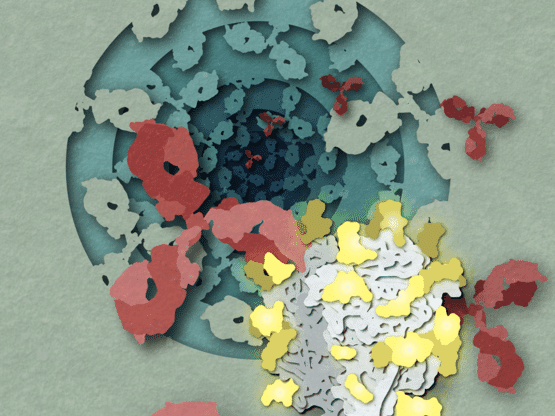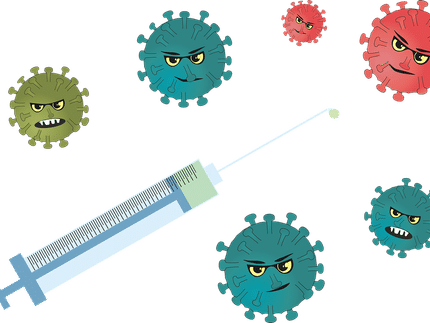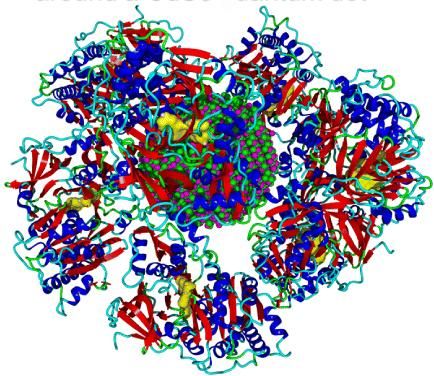Deadly virus structures point toward new avenues for vaccine design
By comparing the structures of protein complexes from different lineages of the dangerous Lassa virus, a Scripps Research team identified new antibodies and vaccine targets
Every year, hundreds of thousands of people in West Africa become infected with Lassa virus, which can cause Lassa Fever and lead to severe illness, long-term side effects or death. There are currently no widely approved treatments or vaccines for the disease. Now, scientists at Scripps Research have determined the structure of the critical protein complex that lets Lassa virus infect human cells. The research, published online in Cell Reports, also identified new antibodies that bind to these proteins and neutralize the virus, paving the way toward more effective vaccines and treatments for Lassa virus.

An illustration of antibodies (red) seeking out the Lassa virus glycoprotein complex (GPC, white) in the human bloodstream. New research on the structure of the GPC, which is coated in sugar molecules (yellow), helped researchers define its interactions with effective antibodies.
Hailee Perrett, Scripps Research
“This work is a big step forward in our ability to isolate new antibodies to relevant sites of vulnerability on the virus, and it provides a basis to conduct rational vaccine design to broadly protect people against many lineages of the Lassa virus,” says senior author Andrew Ward, PhD, professor of Integrative Structural and Computational Biology at Scripps Research. “These new reagents described in the paper are already being put to good use and yielding exciting new results.”
Like many viruses, Lassa virus exists in a variety of lineages, each with slight variations in its genes. This diversity has made it challenging to pinpoint antibodies that recognize all versions of Lassa virus. Scientists have also struggled to isolate Lassa glycoproteins—the spike-like proteins that surround the virus and are the target of most antibodies. In the infectious virus, these glycoproteins exist in complexes of three, called trimers. For decades, however, scientists were only able to isolate glycoproteins in the lab as single proteins and not in their trimer complexes.
In 2022, Ward and colleagues discovered how to use nanoparticles to hold the glycoproteins together into trimers. In the new work, they used that technique to isolate and structurally characterize trimers of the glycoproteins from four different Lassa virus lineages. Surprisingly, the glycoprotein structures from the distinct lineages were extremely similar.
“We were hoping to see more obvious differences that would explain why antibodies didn’t recognize all the lineages,” says Hailee Perrett, a Scripps Research graduate student and first author of the work. “Instead, we found a very high level of conservation across the peptide and sugar components of the protein.”
Using the same stable glycoproteins, Ward, Perrett and their colleagues next used blood samples from patients who had recovered from Lassa virus to isolate antibodies against the glycoprotein trimers. They found new antibodies and characterized previously discovered antibodies that recognize different lineages of the Lassa virus glycoprotein, which may be useful in developing a treatment or preventive vaccine against the virus.
The team is already planning future experiments to pinpoint more antibodies against the Lassa virus glycoproteins, as well as further analyzing the protein structures to identify places on the glycoproteins that are ideal for targeting with drugs.
“Our goals were to not only try and define some of the structural details of these different Lassa viruses, but to provide foundational protocols and resources for the field,” says Perrett. “We hope our approaches and initial findings help push the science in this field forward.”
Original publication
Other news from the department science
Most read news
More news from our other portals
See the theme worlds for related content
Topic world Antibodies
Antibodies are specialized molecules of our immune system that can specifically recognize and neutralize pathogens or foreign substances. Antibody research in biotech and pharma has recognized this natural defense potential and is working intensively to make it therapeutically useful. From monoclonal antibodies used against cancer or autoimmune diseases to antibody-drug conjugates that specifically transport drugs to disease cells - the possibilities are enormous

Topic world Antibodies
Antibodies are specialized molecules of our immune system that can specifically recognize and neutralize pathogens or foreign substances. Antibody research in biotech and pharma has recognized this natural defense potential and is working intensively to make it therapeutically useful. From monoclonal antibodies used against cancer or autoimmune diseases to antibody-drug conjugates that specifically transport drugs to disease cells - the possibilities are enormous

























































